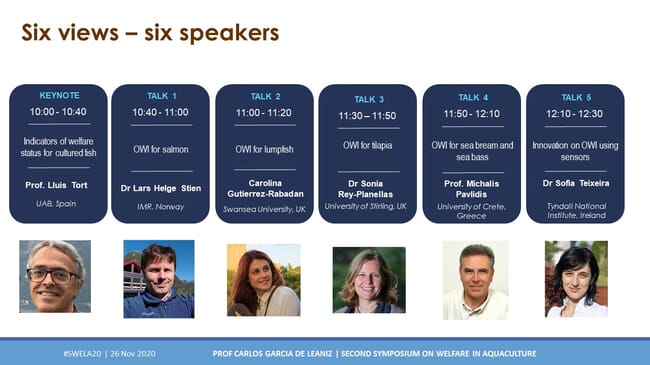
© CSAR
Hosted by Swansea University's Centre for Sustainable Aquatic Research (CSAR) last week, the webinar is now available on YouTube and the talks can be downloaded from the symposium website.
Professor Carlos Garcia de Leaniz, director of CSAR, noted that the motivation behind the event related to the increasing awareness of fish welfare, the link between fish welfare and fish health, and the need for operational welfare indicators (OWIs) that can be used by fish farmers.
Prof Lluis Tort of the Autonomous University of Barcelona explained the real challenges for measuring welfare in farmed fish and noted that, despite more than 30 billion fish being killed by humans each year, their welfare needs are the least well-known of those animals widely used for food. It was also highlighted that most scientists, and the majority of consumers (73 percent), now accept that fish can feel pain.
Dr Lars Helge Stien, of the Institute of Marine Research, focused on OWI for salmon and explained the challenges of measuring welfare in a cage environment with thousands of individuals; he also explained the different welfare indicators, and the merits of having clear decision flow-charts and three-alert levels which are relevant for fish farmers.
The OWIs for lumpfish were discussed by Carolina Gutierrez-Rabadan of CSAR. She explained the challenges of defining welfare for novel farmed species such as the lumpfish and provided examples of the importance of measuring the reliability in OWIs, and the need for simplification and validation. She presented a practical lumpfish operational welfare score index (LOWSI) and highlighted that most (70 percent) lumpfish she sampled in salmon farms were in good condition with only 2 percent in poor welfare status.
Dr Sonia Rey Planellas of Stirling University pointed out that there are few or no OWIs for tilapia, which is the second most important farmed fish in the world. Tilapia is farmed mostly in developing countries where welfare needs may not always be a priority. Another challenge is the complex social behaviour and aggression shown by this species.
Professor Michalis Pavlidis, of the University of Crete, discussed the different welfare challenges posed by sea bass and sea bream at different production stages; he highlighted the need to keep temperature within optimal limits as a key welfare consideration for these very important Mediterranean farmed fish. Professor Pavlidis highlighted the big improvements that the industry has made to make slaughtering more humane.
Dr Sofia Teixeira, of Tyndall Institute in Ireland, presented non-invasive, rapid tests using smart sensors which can be used to monitor health by measuring indicators such as cortisol and other parameters that have wide applications in the assessment of immune competence, stress, growth, and behaviour.
The next Symposium on Welfare in Aquaculture which will be hosted in Crete in 2021.
The event was supported by: Access2Sea, Smartaqua and the Centre for Sustainable Aquatic Research
